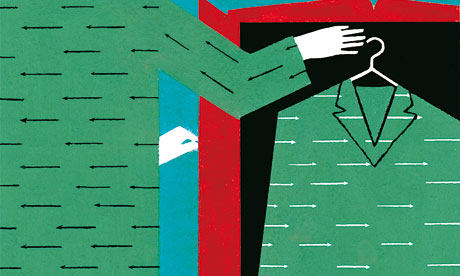
For reasons I have never fully grasped, the 1981 classic on the art of negotiation, Getting To Yes, seems to sell especially well in airport bookshops: alongside Scandinavian crime and Michael McIntyre memoirs is a stack of Roger Fisher and William Ury's book, which has been reissued in a 30th anniversary edition. Is it bought by hijack-fearing flyers who think it might be useful in a hostage situation? Or perhaps readers respond to its central insight that, deep down, "everyone is a negotiator... We negotiate, in an informal sense, with just about everyone we meet, from morning to night." Some airport buyers may be off to high-stakes business negotiations. But others will be heading off on family holidays – and that, from the perspective of this surprisingly non-cheesy book, may ultimately be much the same thing.
The point isn't that we're all secretly selfish, vying for petty advantage when it looks like we're cooperating. But nor is Getting To Yes an exhortation to be nice and get along. Rather, Fisher and Ury reckon we're thinking about negotiation wrongly. In household squabbles and global disputes, we instinctively engage in "positional bargaining" – adopting a position, arguing for it, then making concessions until compromise is reached. But whether you do this stubbornly or amicably, says Getting To Yes, you're doing it wrong, because the problem is with the notion of position-taking itself.
The culprit is ego: once you've identified with a position, it's almost impossible not to take what happens to it personally. You are no longer seeking the most sensible solution, but trying to avoid diverging from a stance that's become merged with your sense of self. This also explains the "backfire effect". One 2006 study exposed people to a fake news story claiming that weapons of mass destruction had been found in Iraq; when shown a story correcting that, those predisposed to believe the first tale believed it more. Dispensing with the belief would mean dispensing with part of themselves.
Getting To Yes is a recipe book of ways to take ego out of negotiation, which might seem obvious if we didn't so routinely ignore them. Look behind superficial positions to underlying interests, the authors advise; and be stubborn – not in defence of your position but in insisting on deciding some objective criteria of agreement. All of which shifts the focus from the game of position-versus-position to the "meta-game" of figuring out what game you're playing – where agreement may prove easier to reach. To use a cringeworthy bit of managementspeak appropriately for once, the point is to "change the game" – to one where opponents "see themselves working side by side, attacking the problem, not each other".
A poignant anecdote in the book hints at what benefits might follow. It's 1970, and Egypt's president Nasser is being interviewed. His position: Golda Meir's Israel must withdraw troops "from every inch of Arab territory", with no Arab commitment in return. The usual hard-faced intransigence of geopolitics, then – until the interviewer switches from positions to interests. What would happen to Meir, he asks, if she went on TV tomorrow to announce such a capitulation? Nasser bursts out laughing, and for a moment human connection transcends the international standoff: "Oh," he replies, "would she have trouble at home!"
oliver.burkeman@theguardian.com

